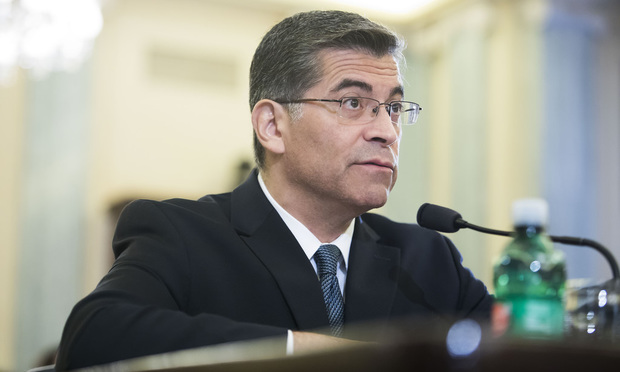How Changes to California's Data-Privacy Rules Would Affect Employers
The clock is ticking for employers to comply with the new law.
September 14, 2019 at 08:33 AM
5 minute read
 Sacramento State Capitol building on Capitol Way. Credit: Jason Doiy/ Recorder
Sacramento State Capitol building on Capitol Way. Credit: Jason Doiy/ Recorder
State lawmakers have sent to Gov. Gavin Newsom what will likely be the final amendments to the California Consumer Privacy Act before the landmark data-privacy bill goes into effect on Jan. 1.
The proposed changes offer some clarification for businesses and employers, but they also renewed calls from the tech industry for the U.S. Congress to override the new state law that lets consumers know, and in some cases control, what information companies collect about them.
"Actions taken by the Legislature this year will improve the California Consumer Privacy Act, but many clarifications are still necessary before it will work for consumers and businesses," Courtney Jensen, Technet's executive director for California, said in a statement. "The importance of federal action to avoid a patchwork of privacy laws has never been clearer, and we urge Congress to act."
The amendments do not reflect the broadest changes sought by both advocates and critics of the California Consumer Privacy Act, or CCPA. There will be no private right of action. There are no mass exemptions.
"The most significant thing about CCPA amendments is actually that very few changes will take place," said Lydia de la Torre, of counsel at Squire Patton Boggs. "Most bills were defeated and the changes are modest."
The clock is ticking, however, for employers to comply with the new law.
The Consumer Privacy Act applies to companies with gross revenues of $25 million or more and that receive, sell or share personal information about more than 50,000 Californians or that derive more than half their revenue from selling customer data.
The definition covers employers, too, and the information they collect about job applicants and workers. Amendments sent to the governor, however, give employers a one-year exemption from requirements that they disclose that information upon request. The delay is designed to give labor groups, privacy advocates and business association time to hammer out a compromise about what data employers need to share with their workers.
"Everyone is going to have to sit down with their counsel and say, 'OK, does this exempt me?'" said Philip Recht, partner in charge of Mayer Brown's Los Angeles office. "If they conclude that they are covered to some extent, they have to decide how they're going to comply from a mechanical, operational perspective."
If the law is not amended in 2020 to extend the exemption or permanently change the workplace provisions, employers should "get ready for access requests from current and former employees, which tend to be complicated and time consuming," de la Torre said. "A pitfall to avoid is long retention periods especially for unstructured data" such as emails, she said.
 Xavier Becerra, Attorney General of California, 2017. Credit: Diego M. Radzinschi / ALM
Xavier Becerra, Attorney General of California, 2017. Credit: Diego M. Radzinschi / ALMDraft regulations that may also offer more compliance guidance to employers are due from Attorney General Xavier Becerra this fall.
Becerra's office earlier this year asked for public comments on a wide range of Consumer Privacy Act topics, including possible exemptions from the law and requirements for complying with requests for data. The attorney general will begin enforcing the new law in July.
Here are other key Consumer Privacy Act bills sent to the governor:
>>> AB 1355 creates a one-year exemption shielding business-to-business communications and transactions from certain disclosure provisions. The bill also authorizes the attorney general to decide what constitutes a "verifiable consumer request" for information in an attempt to ensure that personal data does not fall into the wrong hands.
>>> AB 1146 allows a business to keep customers personal information if that data is necessary to provide a warranty or product recall information.
>>> AB 874 clarifies that the definition of personal information under the Consumer Privacy Act does not include "deidentified" or aggregate consumer data. The measure adds business-sought language clarifying that personal information must be "reasonably capable" of being associated with a particular consumer or household, as opposed to just "capable," to be subject to the law's disclosure requirements.
Read more:
Calif. Attorney General On the Hunt for Consumer Privacy Act Enforcers
As California Passes Landmark Worker Rights Bill, a Familiar Foe Takes Aim at Uber
New Bill Clears Path for Freelance Attorney Independent Contractor Status
Late Changes to California Labor Bill Would Empower City Attorneys
This content has been archived. It is available through our partners, LexisNexis® and Bloomberg Law.
To view this content, please continue to their sites.
Not a Lexis Subscriber?
Subscribe Now
Not a Bloomberg Law Subscriber?
Subscribe Now
NOT FOR REPRINT
© 2025 ALM Global, LLC, All Rights Reserved. Request academic re-use from www.copyright.com. All other uses, submit a request to [email protected]. For more information visit Asset & Logo Licensing.
You Might Like
View All
'A Death Sentence for TikTok'?: Litigators and Experts Weigh Impact of Potential Ban on Creators and Data Privacy

Patreon Hit With Lawsuit for Allegedly Diverting Subscriber Data to Meta

TikTok Hit With California Class Action for Allegedly Mining Children's Data Without Parental Consent

Trending Stories
- 15th Circuit Considers Challenge to Louisiana's Ten Commandments Law
- 2Crocs Accused of Padding Revenue With Channel-Stuffing HEYDUDE Shoes
- 3E-discovery Practitioners Are Racing to Adapt to Social Media’s Evolving Landscape
- 4The Law Firm Disrupted: For Office Policies, Big Law Has Its Ear to the Market, Not to Trump
- 5FTC Finalizes Child Online Privacy Rule Updates, But Ferguson Eyes Further Changes
Who Got The Work
J. Brugh Lower of Gibbons has entered an appearance for industrial equipment supplier Devco Corporation in a pending trademark infringement lawsuit. The suit, accusing the defendant of selling knock-off Graco products, was filed Dec. 18 in New Jersey District Court by Rivkin Radler on behalf of Graco Inc. and Graco Minnesota. The case, assigned to U.S. District Judge Zahid N. Quraishi, is 3:24-cv-11294, Graco Inc. et al v. Devco Corporation.
Who Got The Work
Rebecca Maller-Stein and Kent A. Yalowitz of Arnold & Porter Kaye Scholer have entered their appearances for Hanaco Venture Capital and its executives, Lior Prosor and David Frankel, in a pending securities lawsuit. The action, filed on Dec. 24 in New York Southern District Court by Zell, Aron & Co. on behalf of Goldeneye Advisors, accuses the defendants of negligently and fraudulently managing the plaintiff's $1 million investment. The case, assigned to U.S. District Judge Vernon S. Broderick, is 1:24-cv-09918, Goldeneye Advisors, LLC v. Hanaco Venture Capital, Ltd. et al.
Who Got The Work
Attorneys from A&O Shearman has stepped in as defense counsel for Toronto-Dominion Bank and other defendants in a pending securities class action. The suit, filed Dec. 11 in New York Southern District Court by Bleichmar Fonti & Auld, accuses the defendants of concealing the bank's 'pervasive' deficiencies in regards to its compliance with the Bank Secrecy Act and the quality of its anti-money laundering controls. The case, assigned to U.S. District Judge Arun Subramanian, is 1:24-cv-09445, Gonzalez v. The Toronto-Dominion Bank et al.
Who Got The Work
Crown Castle International, a Pennsylvania company providing shared communications infrastructure, has turned to Luke D. Wolf of Gordon Rees Scully Mansukhani to fend off a pending breach-of-contract lawsuit. The court action, filed Nov. 25 in Michigan Eastern District Court by Hooper Hathaway PC on behalf of The Town Residences LLC, accuses Crown Castle of failing to transfer approximately $30,000 in utility payments from T-Mobile in breach of a roof-top lease and assignment agreement. The case, assigned to U.S. District Judge Susan K. Declercq, is 2:24-cv-13131, The Town Residences LLC v. T-Mobile US, Inc. et al.
Who Got The Work
Wilfred P. Coronato and Daniel M. Schwartz of McCarter & English have stepped in as defense counsel to Electrolux Home Products Inc. in a pending product liability lawsuit. The court action, filed Nov. 26 in New York Eastern District Court by Poulos Lopiccolo PC and Nagel Rice LLP on behalf of David Stern, alleges that the defendant's refrigerators’ drawers and shelving repeatedly break and fall apart within months after purchase. The case, assigned to U.S. District Judge Joan M. Azrack, is 2:24-cv-08204, Stern v. Electrolux Home Products, Inc.
Featured Firms
Law Offices of Gary Martin Hays & Associates, P.C.
(470) 294-1674
Law Offices of Mark E. Salomone
(857) 444-6468
Smith & Hassler
(713) 739-1250






